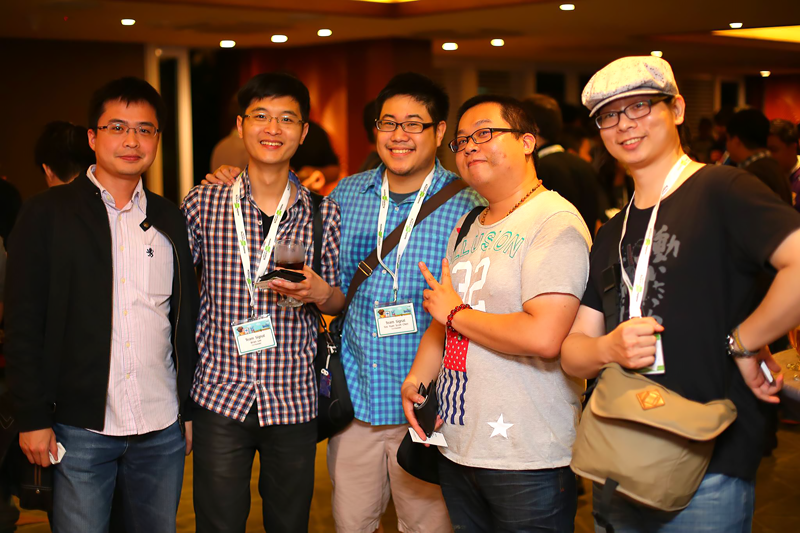This interview has been edited and condensed.
The brainchild of Brian Lee and Scott Chen in 2013, SIGONO (originally known as Team Signal) is an independent game development Studio based in Taipei, Taiwan. SIGONO has put out a select few titles over the years. Their most recent release, OPUS: The Day We Found Earth (2015), gained international attention for its storyline and emotional depth. A year later, amidst several other awards and nominations, The Day We Found Earth was awarded Editor’s Choice and Best Mobile Game by Google Play and Indieplay, respectively. In 2016, the team began a new, imaginative project, set loosely within the same universe as The Day We Found Earth. This current project, OPUS: Rocket of Whispers, is targeted for a summer 2017 release.
On the morning of April 19th, OPN Editor-in-Chief Rey Urias and I had the opportunity to sit down and have an interview with a couple members of the SIGONO team: Scott Chen, co-founder of SIGONO , and Sam Chen, UI designer and Hylics enthusiast. The twelve-hour time difference between Rey and everyone else notwithstanding, we met via video conference and spoke for over an hour.
We started by dipping into the company’s history. Scott shared how he and Brian Lee, after finishing grad school at Carnegie Mellon, had launched the company together. “We decided to start our company in California,” Scott divulged, “and then (we worked for) almost a year. (But) we found out the cost of living was way too high. Then we decided to move back to our home country, which is Taiwan. That was three years ago.” I was curious whether they would decide to retrace their steps back to the United States at any point in the future, but Scott was confident in the knowledge that SIGONO is well-established and stable in Taiwan.
The Day We Found Earth
“We never started with a robot... trying to find earth,” explained Scott. I wanted to know more about how the story was engineered and why the game took place in space. “We actually just started with simple emotion. We really want to portray that [emotion] when playing our game.”
“It’s the sense of fulfillment as you move and collect (the data),” Sam elaborated. “We wanted players to feel that transition from emptiness to fullness and fulfillment. That’s the core emotion that we wanted to achieve.”
Scott further explained how SIGONO made the link between that emotion and an appropriate setting. “What kind of environment would that (experience) best fit in? Initially, we were thinking deep sea or space. Or a big, wide world,” he mused. “Somehow, we ended up in space.” From there, they started experimenting with music and different art styles and merging them together.
Rey drew attention to their unique approach. It isn’t often that a studio decides how they want their players to feel before any other element or mechanic is established. Scott admitted that it was a different approach from their first two games, which did stem more from the mechanics.
“There’s no emotion in core mechanics,” lamented Scott. “People play it, (but) in a short while they just forget about the game because it’s hollow. There’s nothing emotional about it. There’s nothing you’ll remember about the game. That’s why, with OPUS, we took a completely different approach. We started from emotion instead of a core mechanic
This development approach has continued to be a driving force for the SIGONO team. Thinking about the player, and in what circumstances the player might find themselves, can be instrumental in designing and creating the right environment.
But, because gauging proper emotional results from users isn’t an easy test to administer, the team looks rather at how players react to various scenarios within the game, and whether the users were inclined to continue or veer off-course. SIGONO seeks to implement approachable design with achievable goals, tactfully infusing musical compositions and visual artwork which assist players in losing themselves within the world of OPUS.
A pattern has emerged as SIGONO released the title for their latest project. The titles of The Day We Found Earth as well as Rocket of Whispers are each preceded by the stylized word “OPUS.” I asked the team about what sort of connection this meant, and whether any further meaning was tied to the noun.
“Apart from being a musical composition, ‘opus’ also refers to ‘magnum opus,’ which is Latin for ‘great work.’ It’s generally a person’s best and greatest piece,” Sam began, expounding on the significance of the term. “Also... a ‘magnum opus,’ in alchemy, can refer to the philosopher’s stone, mortality, transcendence – and the belief that they are all one and the same. (To) achieve or create the philosopher’s stone or achieve spiritual transcendence, one must ascend. (This) consists of testing your spirit and mind and body. So if you look at it from that angle, and for any player who would take more from (the term) ‘OPUS,’ I think you’ll find some interesting references in there. I think our writing department did a really good job in connecting all the dots for that framework.”

The SIGONO team is currently building out to eleven members. The company size has more than doubled since the first OPUS installment, which evidently had “four and a half” members, according to Sam. “At that time, we had a composer who worked part-time,” related Scott. “Now he’s full time with the company.”
When it came to finding a target audience, SIGONO’s approach turned out to be very grass roots. The team members worked together to find, amidst their own friend groups, individuals who seemed to be their target audience. The team then began paying attention to the social media pages of those people, noticing which groups they liked to join, and discovering their interests. After gleaning some insight on those friends’ preferences, the team then began interviewing them with more specific inquiries.
“We actually constantly sent text posts to (a few of) them and asked for their critique,” Scott mentioned. “Because we think that they’re the most approachable target audience we can (reach). We tried to stay in constant contact with them.”
“Generally, their opinion on design has had more weight than any given member of the development team,” added Sam. “Because we aren’t necessarily the target audience. We might have overlapping interests. But in the end, it’s them; we kind of hold their interests (in mind).”
Rocket of Whispers
I posed the question to Sam and Scott about how they would summarize their new game.
“(You) help a witch (shoot) ghosts into space with a rocket,” replied Sam confidently. “That’s it. It has all the points that our testers have been curious about. It has the witches, the ghosts, the rockets.”
“It’s a (post) apocalyptic world…” Scott took a little time to formulate his answer. “You search for ingredients. (You're) trying to build a rocket to send the dead to space. It’s all about trying to build a rocket.”
“(The) ‘whispers’ are the ghosts,” Sam responded. “The idea is that (it’s) a rocket full of spirits. These ghosts, these ‘whispers,’ these murmurings (are) returning to space. We try to create an image with the title. We want to evoke something very vivid.”
“The player will control the main character and walk around a snow-covered world,” Scott detailed, “And then he’ll walk past a lot of desolated towns. Visually, we try to create a sense of loneliness. You’ll see a lot of buildings already collapsed. People will wander (in) those. People will... understand the story of what happened around that city or town. We use a lot of stories, visuals, and music to give a sense of loneliness.”
“Just like the first OPUS,” Sam associated, “All the elements are with that emotion in mind. With the music as well – I think our composer did a really good job in building that atmosphere. And with my art (and) effects, I tried to get across some key elements of that.”
When they considered whether the two OPUS games were connected somehow, Sam explained that, though both The Day We Found Earth and Rocket of Whispers were in the same universe, “[the titles] are largely unrelated.”
“Story-wise, you won’t find Emeth, or Lisa, or anybody related to the first one,” Scott assured us.
Closing Remarks
We closed by discussing whether the duo had any side projects of their own they sought to complete in the future.
“Personally,” began Scott, “– not speaking from the company’s mouth –” he quickly qualified, “I would want to make my own game (where) people could connect with each other and... have the same goal. (They would) try to complete something. Maybe (a) journey. You would connect with a stranger. You would have the same goal, and try to work together without actually communicating... I want to make an online game, but not about fighting.”
“I want to try out that genre of infinite runners,” considered Sam, “but with a really (captivating) story to it.” He used KetchApp as an example of infinite runner games as he explained his idea further by posing a hypothetical question: “What if you added something really dense to it?”
I was privileged to sit down with Sam and Scott. It was enthralling and informative to be let inside the OPUS world and the minds that have worked so hard in creating it. I look forward to the release of OPUS: Rocket of Whispers in the next few months. Until then, I shall be listening to some alluring musical compositions from SIGONO’s previous game, OPUS: The Day We Found Earth.
--
[Correction: An earlier version of this article stated that Sam Chen was a Katamari Damacy enthusiast. While we are sure that Sam enjoys Katamari as much as the next gamer, this is a misattribution: it is Scott Chen who is the Katamari fan; Sam Chen prefers the "recreational program with light JRPG elements" Hylics -- which makes more sense.]

